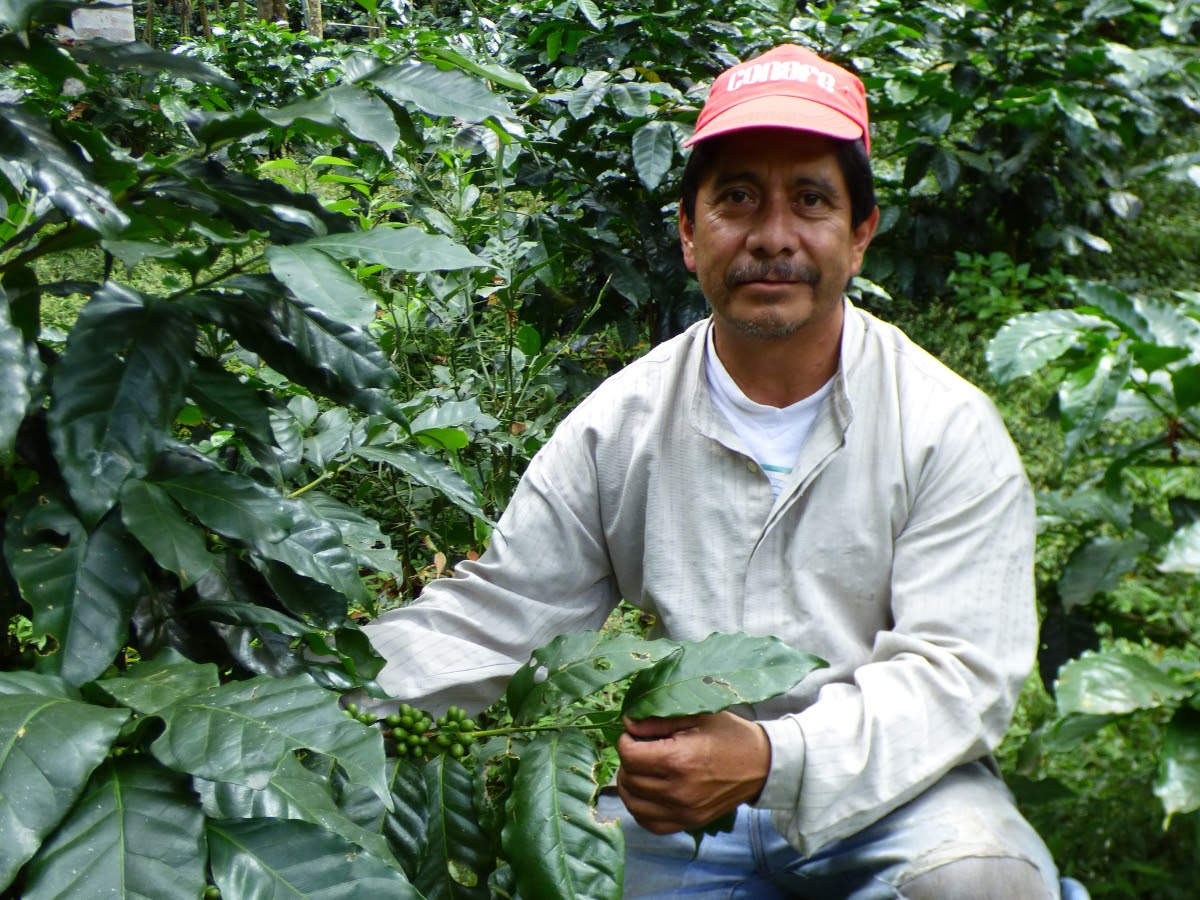René Hernández is a model for other coffee smallholder producers in Mexico. Here, he shows his coffee plantation, which he has renewed with rust-resistant strains.
René Hernández’s story is a testimony to how the social aspect of the crop plays an important role in smallholder coffee producer prosperity and success. René Hernández inherited his plantation from his aunt, who years ago had planted, through traditional methods, thousands of plants that once produced up to 80 quintals of coffee per season.
The devastating effects of climate change
The coffee rust epidemic hit hard in 2012 and the effects of this infectious agent continue to devastate plantations to this day. Coffee rust is a fungus that ultimately prevents plants from growing the cherries that produce beans. By 2014, Hernández’s plants had dropped production to no more than three quintals per season. The family faced extremely difficult financial conditions.
“When coffee rust arrived at our plantation, we felt very sad and heavy-hearted. We asked ourselves, ‘what are we going to eat and how?’ So my husband and I agreed to start working [to make things better]”, said Deyfilia Velázquez, Hernández’s wife.
Climate smart coffee in the foreground and mountains of the “El Triunfo” Biosphere Reserve in the background.
Coffee leaf rust is not new in the region; however, climate change has come to aggravate the problem, as the fungus typically dies off during the dry season. The extra-wet dry seasons in 2011 and 2012 and other climate variabilities have led some scholars to link climate change to the early development of the pathogen in Mexico.
Doing more with less promotes coffee producer prosperity
In 2013, Solidaridad launched Climate Smart Coffee in Latin America, a model which builds the capacity of smallholders to do more with less, thereby fostering coffee producer prosperity and success.
After identifying him as a potential leader who could help test the model in his plot, Solidaridad programme staff spoke with Hernández, who granted access to half of one hectare. Though with a heavy heart, he allowed the removal of between 600 and 900 old coffee plants —originally planted by his late aunt— to be replaced with 2,500 more productive and heartier plants, resistant to coffee rust. This single practice from the Climate Smart Coffee model resulted in more plants that produce more coffee beans, using less land.
The Climate Smart Coffee model proves that it is possible to produce more coffee, with improved quality, using less natural resources and without resorting to deforestation.
Immediately when René Hernández and his family began seeing results, they decided to renew one more hectare through the practices learned. As of 2016, the production has increased to up to 100 quintals of coffee per season. As they were able to, they continued to update each parcel, and now the entire plantation is managed under Climate Smart Coffee.
Social aspects of coffee producer prosperity and success
Hernández’s home periodically serves as a knowledge hub. Producers travel from local and far away communities to visit and learn Climate Smart Coffee techniques from the Hernández family.
“We think that it’s our duty to share the knowledge acquired through all these years”, commented Hernández, who credits the success of his coffee plantation to the work his family and he perform together.
“I have been married for 30 years to my wife. We have four daughters and three granddaughters. There are people who say that they help me, but that’s not true. Here we are all the same, and we work together”
“We have consistently seen the link between family unity and coffee producer prosperity and success. René is a palpable testimony of this. Thanks to the thriving production, his daughters have had access to education, and they, along with their children, now gladly return to and help in the farm. The daughters gladly share farm results on social media.” -Javier Anaya, Solidaridad project officer
Hernández has also participated in communities of practice through the cooperatives, where Solidaridad has linked producers who have successfully implemented the Climate Smart Coffee model with other smallholder coffee producers to share their experiences and results.
“Now that our production is well and stable, we have a next step: we are actively working to preserve the cloud forest where we live. We believe that having decent profits and conserving the environment not only can, but must, go hand in hand,” added Hernández.
Solidaridad technical staff support coffee cooperatives such as the Comon Yaj Noptic cooperative in Chiapas, Mexico, to implement the model.
Climate Smart Coffee directly responds to sector needs so that producers are more competitive, more resilient and more aware of how their practices can affect the environment and our planet. It generates inclusive business models that help producers to access information for decision-making and promotes fair income.
Read more about Solidaridad’s work towards the sustainable production of coffee.

